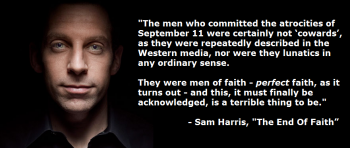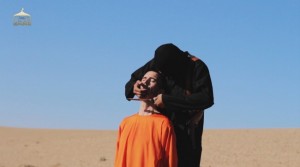EDITOR’S NOTE: As you have no doubt heard by now Ben Affleck and Sam Harris/Bill Maher got into a shout-y, headline-making debate about Islam on the latest installment of Real Time With Bill Maher. You can watch the exchange below, then read Sam Harris’ parsing of what went down.
SAM HARRIS: After the show, a few things became clear about Affleck’s and Kristof’s views. Rather than trust poll results and the testimony of jihadists and Islamists, they trust the feeling that they get from the dozens of Muslims they have known personally. As a method of gauging Muslim opinion worldwide, this preference is obviously crazy. It is nevertheless understandable. On the basis of their life experiences, they believe that the success of a group like ISIS, despite its ability to recruit people by the thousands from free societies, says nothing about the role that Islamic doctrines play in inspiring global jihad. Rather, they imagine that ISIS is functioning like a bug light for psychopaths—attracting “disaffected young men” who would do terrible things to someone, somewhere, in any case. For some strange reason these disturbed individuals can’t resist an invitation to travel to a foreign desert for the privilege of decapitating journalists and aid workers. I await an entry in the DSM-VI that describes this troubling condition.
Contrary to what many liberals believe, those bad boys who are getting off the bus in Syria at this moment to join ISIS are not all psychopaths, nor are they simply depressed people who have gone to the desert to die. Most of them are profoundly  motivated by their beliefs. Many surely feel like spiritual James Bonds, fighting a cosmic war against evil. After all, they are spreading the one true faith to the ends of the earth—or they will die trying, and be martyred, and then spend eternity in Paradise. Secular liberals seem unable to grasp how psychologically rewarding this worldview must be. […]
motivated by their beliefs. Many surely feel like spiritual James Bonds, fighting a cosmic war against evil. After all, they are spreading the one true faith to the ends of the earth—or they will die trying, and be martyred, and then spend eternity in Paradise. Secular liberals seem unable to grasp how psychologically rewarding this worldview must be. […]
After the show, Kristof, Affleck, Maher, and I continued our discussion. At one point, Kristof reiterated the claim that Maher and I had failed to acknowledge the existence of all the good Muslims who condemn ISIS, citing the popular hashtag #NotInOurName. In response, I said: “Yes, I agree that all condemnation of ISIS is good. But what do you think would happen if we had burned a copy of the Koran on tonight’s show? There would be riots in scores of countries. Embassies would fall. In response to our mistreating a book, millions of Muslims would take to the streets, and we would spend the rest of our lives fending off credible threats of murder. But when ISIS crucifies people, buries children alive, and rapes and tortures women by the thousands—all in the name of Islam—the response is a few small demonstrations in Europe and a hashtag.” I don’t think I’m being uncharitable when I say that neither Affleck nor Kristof had an intelligent response to this. Nor did they pretend to doubt the truth of what I said.
I genuinely believe that both Affleck and Kristof mean well. They are very worried about American xenophobia and the prospects of future military adventures. But they are confused about Islam. Like many secular liberals, they refuse to accept the abundant evidence that vast numbers of Muslims believe dangerous things about infidels, apostasy, blasphemy, jihad, and martyrdom. And they do not realize that these doctrines are about as controversial under Islam as the resurrection of Jesus is under Christianity. MORE
MIDDLE EAST QUARTERLY: Islam is the only major world religion today that is cited by both state and non-state actors to legitimize beheadings. And two major aspects of decapitation in an Islamic context should be noted: first, the practice has both Qur’anic and historical sanction. It is not the product of a fabricated tradition. Second, in contradiction to the assertions of apologists, both Muslim and non-Muslim, these beheadings are not simply a brutal method of drawing attention to the Islamist political agenda and weakening opponents’ will to fight. Zarqawi and other Islamists who practice decapitation believe that God has ordained them to obliterate their enemies in this manner. Islam is, for this determined minority of Muslims, anything but a “religion of peace.” It is, rather, a religion of the sword with the blade forever at the throat of the unbeliever. […] Increasingly, Islamist groups conflate “unbelievers,” “combatants,” and prisoners of war, which, coupled with their claim to Islamic legitimacy, provides them with a license to decapitate. MORE
MIDDLE EAST QUARTERLY: Some American commentators say that Islamist decapitations are intended as psychological warfare and devoid of any true Islamic content. Imam Muhammad Adam al-Sheikh, head of the Dar al-Hijrah mosque in Falls Church, Virginia, for example, claimed incorrectly that “beheadings are not mentioned in the Koran at all.”[5] […] Such fulminations have had an effect: the Western news media has, perhaps as a result of political correctness or its own bias,  twisted the reality of Islamic history and propagated such revisionism. With such apologetics, Western academics either display basic ignorance of their fields or purposely mislead. MORE
twisted the reality of Islamic history and propagated such revisionism. With such apologetics, Western academics either display basic ignorance of their fields or purposely mislead. MORE
MIDDLE EAST QUARTERLY: Sura (chapter) 47 contains the ayah (verse): “When you encounter the unbelievers on the battlefield, strike off their heads until you have crushed them completely; then bind the prisoners tightly.”[11] The Qur’anic Arabic terms are generally straightforward: kafaru means “those who blaspheme/are irreligious,” although Darb ar-riqab is less clear. Darb can mean “striking or hitting” while ar-riqab translates to “necks, slaves, persons.” With little variation, scholars have translated the verse as, “When you meet the unbelievers, smite their necks.”[12] MORE
MIDDLE EAST QUARTERLY: Qur’anic scripture: Sura (chapter) 47 contains the ayah (verse): “When you encounter the unbelievers on the battlefield, strike off their heads until you have crushed them completely; then bind the prisoners tightly.”[11] The Qur’anic Arabic terms are generally straightforward: kafaru means “those who blaspheme/are irreligious,” although Darb ar-riqab is less clear. Darb can mean “striking or hitting” while ar-riqab translates to “necks, slaves, persons.” With little variation, scholars have translated the verse as, “When you meet the unbelievers, smite their necks.”[12] MORE
MIDDLE EAST QUARTERLY: Another, albeit less-frequently, cited Qur’anic passage also sanctions beheadings of non-Muslims. Sura 8:12 reads: “I will cast dread into the hearts of the unbelievers. Strike off their heads, then, and strike off all of their fingertips.” MORE
MIDDLE EAST QUARTERLY: Beheading has particular prominence in Saudi Arabia. In 2003 alone, the Kingdom of Saudi Arabia beheaded more than fifty people.[30] This number included both Muslim and non-Muslim workers. Over the past two decades, the Saudis have decapitated at least 1,100 for alleged crimes ranging from drug running to witchcraft and apostasy.[31] MORE
PREVIOUSLY: SURRENDER TO THE VOID: A Metaphysical Q&A With Sam Harris, International Man Of Reason

